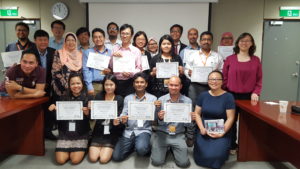by syazli | Jun 1, 2017 | Uncategorized
UTM Razak School researchers join forces with the international humanitarian and climate research centre in an event entitled ”Humanitarian and Hydropower Sectors Join Forces to Manage Flood Risk”, which was held from 9-11 May 2017 at the Hotel Intercontinental, Addis Ababa (Ethiopia). This event is co-convened by the Climate Centre, The International Federation of Red Cross and Red Crescent Societies (IFRC) and the World Bank Global Facility for Disaster Reduction and Recovery (GFDRR), in the context of the World Hydropower Congress 2017. It brings together disaster managers, donors, dam operators, government officials, researchers, and machine learning experts. The objectives of this event are to bring together the global hydropower community and the disaster risk management sector to forge long-term, creative, systemic collaboration. They have jointly explore the new approaches to flood risk management downstream of dams, focusing on two promising opportunities: ‘Forecast-based Financing’ (FbF) and Machine Learning. FbF is being piloted in West Africa through a digital tool called FUNES: Volunteers collect rainfall data in the Mono river basin upstream of the Nangbéto Hydropower Dam in Togo, and an innovative self-learning algorithm designed under data scarcity which anticipates the probable timing and discharge of any imminent dam overspill. This forecast enables dam operators to plan releases, including those that may inundate communities downstream, according to a downstream model. When FUNES forecasts flood elevated flood risk, the Red Cross, government and partners receive an automated message to activate radio alerts, distribute water purification kits, and deploy other pre-funded disaster preparedness measures. The participants also able to test the FbF in Togo through Virtual Reality (VR) technology. First successfully tested in September 2016, the FbF+FUNES system received the 2017 World Government Summit’s Global Innovation Award. This side event gave an opportunity to open dialogue with all actors on the given opportunity to adapt and scale up this hydro-humanitarian collaboration to simultaneously improve hydropower operations and humanitarian outcomes. There are prospects of adapting this approach to river basins in Malaysia.
Source: https://people.utm.my/blog/2017/05/15/manage-flood-risk/
by syazli | Jun 1, 2017 | Uncategorized
2017 Advance Institute on Knowledge-based Actions (AI-KBA) for Disaster Risk Reduction (DRR) was held from 17-21 April 2017 in Taipei, TAIWAN. AI-KBA was organised by the Integrated Research on Disaster Risk, International Centre of Excellence, Taipei (IRDR ICoE-Taipei), International Council for Science (ICSU) Regional Office for Asia and the Pacific (ICSU ROAP), National Science and Technology Centre for Disaster Reduction (NCDR) and Academia Sinica. The objective of the Advanced Institute on KBA is to provide young to mid-career practitioners, researchers and policy makers in the region with the best practices, enhanced understanding, skills and practical knowledge to apply systems approaches in DRR knowledge-based actions. A group of eight countries from Malaysia, India, the Philippines, Pakistan, Singapore, Thailand, Myanmar and Bangladesh participate in AI-KBA. Malaysian scholar was presented by four UTM Razak School and MJIIT academicians and researchers.
This event was reported in several Taiwan Media and News agencies as follows:-
http://www.mypeople.tw/index.php?r=site/article&id=1542372
http://www.greatnews.com.tw/home/news_pagein.php?iType=1009&n_id=136818
http://n.yam.com/greatnews/society/20170420/20170420160601.html
http://www.cna.com.tw/postwrite/Detail/212060.aspx#.WPhmMPl96Uk
https://udn.com/news/story/7316/2415095
http://www.chinatimes.com/realtimenews/20170420003957-260405
http://m.match.net.tw/pc/news/life/20170420/4031169
http://n.yam.com/cna/society/20170420/20170420160643.html
http://www.idn-news.com/news/news_content.php?catid=5&catsid=7&catdid=0&artid=20170420joanne009
http://www.cna.com.tw/news/asoc/201704200247-1.aspx
https://udn.com/news/story/7316/2415095
Source: https://people.utm.my/blog/2017/04/25/ai-kba/

by syazli | Aug 1, 2016 | Uncategorized
Executive Diploma Class
This course introduces students to the fundamentals of ICT and its role in the modern business setting. Students are exposed to the different types of information systems and their role in the organisation. Students will learn basic concepts of data and information and how information is used in Business Intelligence & Analytics to efficiently manage a business.
Date: 20 & 21 August 2016
Venue: USM, Penang
More information regarding this course: https://frsb1103.wordpress.com/
by syazli | Oct 21, 2015 | Uncategorized
This course introduces students to the fundamentals of ICT and its role in the modern business setting. Students are exposed to the different types of information systems and their role in the organisation. Students will learn basic concepts of data and information and how information is used in Business Intelligence & Analytics to efficiently manage a business. At the end of the course, students are required to assemble a simple information system relating to facility management business using EXCEL as a tool supplemented by bar-coding for tracking purposes.
More info about this class can be access from Current Class tab or this link:
http://frsi1103.wordpress.com
by syazli | Nov 12, 2014 | Uncategorized
Salam,
Lecture notes and others can be access from: http://elearning.utm.my/14151/
Please use your ACID ID to login.
Thank you,
Syazli
by syazli | Feb 27, 2014 | Uncategorized
Master in Engineering Business Management (MDK 2583 – Project Management)
Organizations achieve their goals through projects. In project based organizations, this is obvious. In other organizations, strategy is implemented through projects. This module will expose managers and engineers on topics pertaining to project management. It focuses both on the technical tools of project management and the human elements. It provides quantitative tools and techniques in assessment and decision making, while exploring insights into human behaviour and group dynamics in projects. Lesson on what makes a project a success or failure will be discussed through structured teaching and case studies.
More info about this class can be access from Current Class tab or this link:
http://mdk2583.wordpress.com

